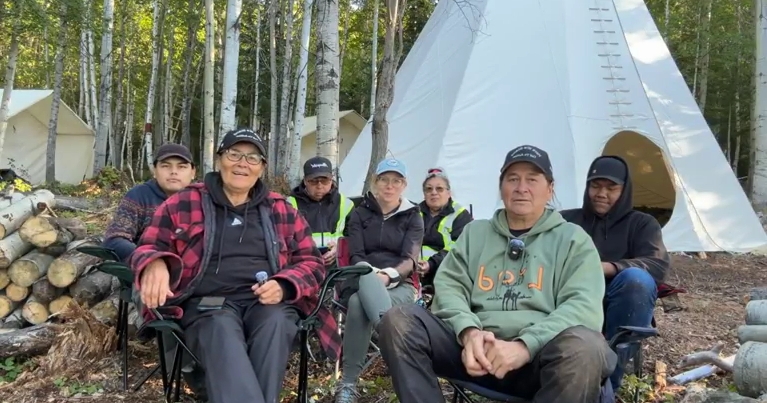submitted photo
Here We Stand - Call To Action land protesters are continueing their work on the Attawapiskat River in protest against Ontario's Bill 5 and Canada's Bill C5. Pictured are the group at their permanent camp on the Attawapiskat River. From L-R: Konstantinov Wesley, Monique Wesley, David Kataquapit, Kerrie Blaise, Lucy Spence, James Kataquapit and Sage Iahtail
One of the most beautiful serene places I’ve ever visited was on the banks of the Opinagau River in northern Ontario, just near the corner of land where James and Hudson Bay meet. This is a river just south of the Lakitusaki River, known in English as Lake River. Opinagau River is also just north of the Nawashi River, the home territory where my mom Susan (Paulmartin/Rose) Kataquapit and her family originated from.
My dad Marius Kataquapit took us to this northern river one fall to go moose hunting. Our group never did manage to see any moose on that trip but it was an amazing time to be on the land surrounded by absolutely no one for hundreds of miles all around.
During that trip, we set up regular base camps along our way and whenever we stopped, my younger brothers and I would head out to walk as much and as far as we could to explore the land.
I remember one afternoon, as we followed the banks of this great river, the sun was warm in the early fall weather and the air was rich with the scent of the forest and the trees. We saw the trickle of a small creek draining into the river and we decided to follow the stream of water. The crystal like line of water wound its way through the tall grass and bushes and rose higher and higher leading to a gap in the steep banks of the river. The gap widened and rose slightly higher as we moved on. The trickle of water sprouted from a dense mass of mud, sticks, trees and brush that made up a great beaver dam that stood about ten feet high. We grew excited at our find and climbed up to see the lake behind it.
On the crest of this great dam was an amazing sight. We faced west and could see the sun reflecting off a still water lake. Pond vegetation lined the shore, tall grass was spotted everywhere, lily pads floated on the surface and towering trees full of the dull leaves of the late summer surrounded the lake. Everything seemed to be full of life and activity. We could see where beavers had broke trails into the forest, spots of matted grass where moose or bear might have laid down and birds chirped or sang in the forest. It looked as if it were a picture perfect play or production that had been specially made for us to see. We stood in wonder for a while and marvelled at the sight. We knew we were only one of a very few people in the world and throughout time to have visited and witnessed this place.
I think of that place and that moment often. It was so peaceful, so quiet, so serene and so perfect. I imagine that bit of paradise multiplied a million times and realize that this is what makes up the Hudson Bay lowlands and the untouched forests, marshes and peatlands that is the lifeblood in this part of the province and indeed a contributor to life for the planet. This untouched, pristine land and its natural environment act as a giant carbon sink that collects and stores much of the planet’s green house gases. To many researchers and scientists it is known as one of the planets largest such carbon sinks and any disruption to this environment not only releases this carbon back into the atmosphere but it also removes the land’s ability to collect that carbon in the first place. The danger in destorying means more global warming.
I want to thank all those people, like my relatives Jeronimo Kataquapit and his family, who have taken the time and effort to attend to the land in order to protect it. I commend all those families that have made the effort to occupy the land that our people have lived on for thousands of years. Their journey as part of ‘Here We Stand: Call To Action’ has been difficult but they have also been rewarded and nourished by Mother Earth on their protest to protect the land from all kinds of resource development being driven by their opposition to Ontario’s Bill 5 and Canada’s Bill C5. These youth and Elders are standing their ground for all of us and they are up against huge government pressure both provincially and federally as well as mammoth corporations with plans for many billions of dollars in development in the very heart of Mother Nature. I am in awe of their devotion, wisdom and courage and I remind everyone to support them in their efforts. I urge all First Nation organizations, communities, Chiefs and council members to help these people financially and by sending crews to assist in this stand. I also urge secondary schools and post secondary schools to organize and fund visits of students to learn and help in this valiant effort.








I recently lost my cousin Joey Okimaw. We were childhood friends who had grown up together since we first entered grade school in Attawapiskat. Joey’s...
I was surprised recently when I saw my relatives in my home community of Attawapiskat First Nation on the James Bay coast were still having to fetch water...